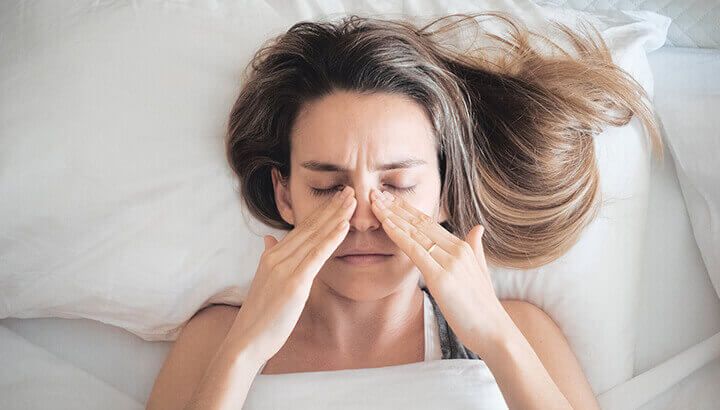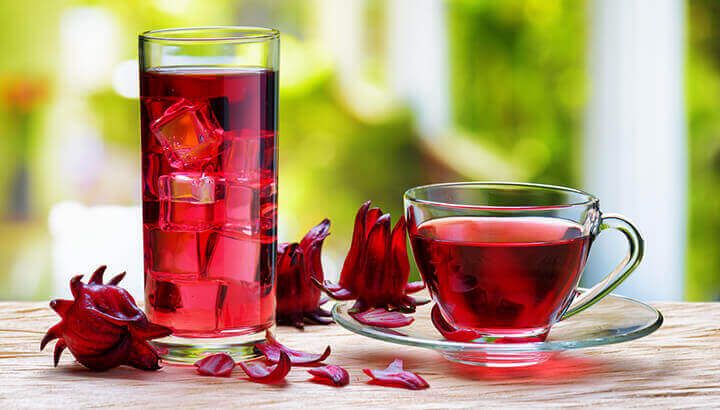
When I was 11 years old, my family took a vacation to Kona, a city on the Big Island of Hawaii. It was a long, exhausting plane ride, but as soon as we arrived, it was paradise. I remember walking down the sidewalks near the beach and feeling absolutely dazzled. Hibiscus trees were everywhere, covered in big, gorgeous, colorful flowers. They lined all of the downtown streets in Kona, and the smell in the air was indescribable.
It wasn’t until many years later that I learned that not only are hibiscus flowers beautiful and fragrant, they also have a wide array of health benefits. One way to reap these benefits is to drink hibiscus tea. Also known as “sour tea,” this dark red tea is made from the flowers leaves and calyces (centers) of hibiscus. Another way to get great health benefits from hibiscus is to topically apply hibiscus oil, which can be cold pressed from the flowers.
Both of these products, when they’re high quality and pure, can do great favors to your health. If you would like to know more about what these amazing flowers can do, the following are nine benefits of hibiscus.
Rich in antioxidants
Hibiscus tea is rich in antioxidants. These include vitamin A and vitamin C, along with anthocyanins and malic acid. All of these antioxidants combined help to combat free radical damage throughout your body and lower inflammation. As inflammation can be very dangerous when it becomes chronic, drinking hibiscus tea on a regular basis is a smart choice for your overall health.
Filled with nutrients
Along with vitamins A and C, hibiscus tea also contains several B-vitamins, along with a wealth of minerals including copper, zinc and a good amount of iron. This tea also contains protein and omega-3 essential fatty acids. So, for a vitamin, mineral and antioxidant boost, this tea is a nutritional superstar.
Boosts immune system function

The antioxidants, vitamins and compounds found in hibiscus tea can do you a real service when cold and flu season hits. Drinking this tea regularly may help to support a healthy immune system, making you less likely to come down with whatever nasty bug is going around at the time.
Lowers blood pressure
One of the most noteworthy benefits of hibiscus tea is its researched potential to lower blood pressure, thus contributing greatly to improving cardiovascular health. For one example, a 1999 study published in the Journal of Ethnopharmacology tested the effects of hibiscus tea on individuals with moderate essential hypertension. Results showed that after 12 days of drinking hibiscus tea, systolic blood pressure in the experimental group was 11.2 percent lower, and diastolic blood pressure was 10.7 percent lower than in the beginning of the study. On their results, the study authors wrote:
“This study proves the public belief and the results of in vitro studies concerning the effects of sour tea on lowering high blood pressure. More extensive studies on this subject are needed.”
To further test this connection, a 2007 study published in the journal Planta Medica tested the effects of an herbal product made from dried hibiscus calyxes on patients with stage 1 or stage 2 hypertension. On their results after the four-week study, the authors asserted:
“… the HsHMP [herbal medicinal product prepared from the dried extract of hibiscus calyxes] exerted important antihypertensive effectiveness with a wide margin of tolerability and safety.”
Lowers cholesterol
Along with lowering blood pressure, hibiscus tea may help to lower LDL (“bad”) cholesterol. After testing this connection, the authors of a 2007 study published in the journal Nutrition Research explained:
“The results indicate that hibiscus flower extracts can reduce serum cholesterol levels in hypercholesterolemic adults. The authors conclude that 1,000 milligrams of hibiscus extract taken three times daily may be the optimal dose. A month of continuous treatment may be required before a significant reduction in serum cholesterol levels occurs. Future studies using a randomized placebo control design will be useful in confirming the results of this study.”
Improves mood

Hibiscus tea is not only good for your body, it may benefit your mental health, as well. Some research has found that the flavonoid antioxidants housed in hibiscus flowers may help to alleviate depression and improve mood. In 2012, researchers involved in a study published in the Indian Journal of Pharmacology tested the effects of hibiscus flavonoids on central nervous system function in mice. On their results, the authors wrote:
“It can be concluded that MHR [anthocyanins] and AHR [anthocyanidins] possess potential antidepressant activity (through dopaminergic, noradrenergic and serotonergic mechanisms) and has therapeutic potential in the treatment of CNS [central nervous system] disorders and provides evidence at least at preclinical levels.”
Encourages optimal digestion
One traditional use of hibiscus tea is as a digestive aid. This tea has diuretic properties, and can thus encourage your body’s production of urine, along with helping to combat constipation. If you’re feeling blocked up, a cup of hibiscus tea may help a lot.
Firms skin
Using hibiscus oil on your skin may help to firm it up and increase its elasticity. This may have a lot to do with the antioxidants found in hibiscus. Not only do they lower inflammation, they may be able to tighten loose, sagging skin, as well. Using hibiscus oil on a regular basis may also help to even out your skin tone.
Contains mucilage
Hibiscus oil has some great moisturizing properties, thanks to its high content of mucilage. Because of this mucilage, hibiscus oil can help your skin hold onto moisture. This oil also contains natural acidic compounds that can help to exfoliate your skin, leaving it looking fresh and youthful.
How to choose the best hibiscus

When choosing hibiscus, always buy from a source you trust. Do your research, and make sure that the company is reputable and does not put additives in their products. For hibiscus oil, always choose 100 percent pure, therapeutic grade oil. For the tea, you can find dried loose hibiscus flowers and calyxes — just make sure they’ve been organically grown.
Always ask a health professional you trust before starting a regimen with any new product. Hibiscus may be unsafe to take with acetaminophen, and may not be best for people with certain health conditions. Always check just to be safe.
If you’ve got the go-ahead from your doctor, go ahead and enjoy a little bit of paradise in your cup!

— Tanya Mead

